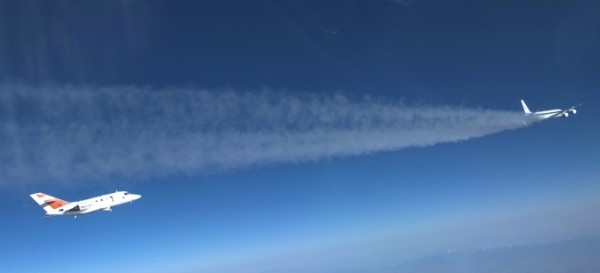
Recognizing that fossil fuels are an issue in the future of aviation, as well as other aspects of transportation and energy, NASA is looking for alternative fuels for aircraft. This week the agency announced that it has entered into separate agreements with the German Aerospace Center (DLR) and the National Research Council of Canada (NRC) to conduct a series of joint flight tests to study the atmospheric effects of emissions from jet engines burning alternative fuels.
As part of the program, tests flights as part of the Alternative Fuel Effects on Contrails and Cruise Emissions (ACCESS II) program are scheduled starting on May 7. The test flight for alternative aviation fuel research will be flown from NASA’s newly renamed Armstrong Flight Research Center in Edwards, California.
NASA will use a variety of research aircraft for the program including the space agency’s DC-8 and HU-25C Guardian. DLR will fly their Falcon 20-E5 and NRC will be operating a CT-133 research aircraft.
During the flight tests, NASA’s DC-8 will utilize a variety of experimental fuel blends, while trailing behind, the Falcon and the CT-133 will measure the exhaust emissions and observe contrail formation.
“Partnering with our German and Canadian colleagues allows us to combine our expertise and resources as we work together to solve the challenges common to the global aviation community such as understanding emission characteristics from the use of alternative fuels which presents a great potential for significant reductions in harmful emissions,” said Jaiwon Shin, NASA’s associate administrator for aeronautics research.
According to the NASA press release, “ACCESS II is the latest in a series of ground and flight tests begun in 2009 to study emissions and contrail formation from new blends of aviation fuels that include biofuel from renewable sources. ACCESS-I testing, conducted in 2013, indicated the biofuel blends tested may substantially reduce emissions of black carbon, sulfates, and organics. ACCESS II will gather additional data, with an emphasis on studying contrail formation.”
Alternative fuel test programs like these are helping to pave the way for the future of private and commercial air travel. Once the impacts of alternative fuel use in aviation are better understood, it could help lead to more widespread use, and ultimately help the alternative fuels become more cost competitive with conventional jet fuels.
![Herbal Reference Substances are Key to Everyday Products <!-- AddThis Sharing Buttons above -->
<div class="addthis_toolbox addthis_default_style " addthis:url='http://newstaar.com/herbal-reference-substances-are-key-to-everyday-products/3512112/' >
<a class="addthis_button_facebook_like" fb:like:layout="button_count"></a>
<a class="addthis_button_tweet"></a>
<a class="addthis_button_pinterest_pinit"></a>
<a class="addthis_counter addthis_pill_style"></a>
</div>When it comes to quality control testing and the development of new products, Botanical Reference Materials (BRMs), also known as Herbal References are critically important. To help companies ultimately obtain all-important FDA approval, the Food and Drug Administration provides in its guidance a recommendation that […]<!-- AddThis Sharing Buttons below -->
<div class="addthis_toolbox addthis_default_style addthis_32x32_style" addthis:url='http://newstaar.com/herbal-reference-substances-are-key-to-everyday-products/3512112/' >
<a class="addthis_button_preferred_1"></a>
<a class="addthis_button_preferred_2"></a>
<a class="addthis_button_preferred_3"></a>
<a class="addthis_button_preferred_4"></a>
<a class="addthis_button_compact"></a>
<a class="addthis_counter addthis_bubble_style"></a>
</div>](http://newstaar.com/wp-content/uploads/2021/02/Achillea_millefolium_flowers-100x100.jpg)
![Quality Electrochemical Biosensors are Critical for Medical, Food and Chemical Industry <!-- AddThis Sharing Buttons above -->
<div class="addthis_toolbox addthis_default_style " addthis:url='http://newstaar.com/quality-electrochemical-biosensors-are-critical-for-medical-food-and-chemical-industry/3512086/' >
<a class="addthis_button_facebook_like" fb:like:layout="button_count"></a>
<a class="addthis_button_tweet"></a>
<a class="addthis_button_pinterest_pinit"></a>
<a class="addthis_counter addthis_pill_style"></a>
</div>A number of industries have, at their core, a need to frequent or even continuous analysis of biological media. These include the medical and pharmaceutical fields, biotech firms, and food and chemical companies. To maintain quality standards and develop new products, these industries rely heavily […]<!-- AddThis Sharing Buttons below -->
<div class="addthis_toolbox addthis_default_style addthis_32x32_style" addthis:url='http://newstaar.com/quality-electrochemical-biosensors-are-critical-for-medical-food-and-chemical-industry/3512086/' >
<a class="addthis_button_preferred_1"></a>
<a class="addthis_button_preferred_2"></a>
<a class="addthis_button_preferred_3"></a>
<a class="addthis_button_preferred_4"></a>
<a class="addthis_button_compact"></a>
<a class="addthis_counter addthis_bubble_style"></a>
</div>](http://newstaar.com/wp-content/uploads/2020/10/Electrochemical-Biosensor-100x100.jpg)
![Company Develops Industrial Mixers Well-Suited for both Fragile and Explosive Products <!-- AddThis Sharing Buttons above -->
<div class="addthis_toolbox addthis_default_style " addthis:url='http://newstaar.com/company-develops-industrial-mixers-well-suited-for-both-fragile-and-explosive-products/3512071/' >
<a class="addthis_button_facebook_like" fb:like:layout="button_count"></a>
<a class="addthis_button_tweet"></a>
<a class="addthis_button_pinterest_pinit"></a>
<a class="addthis_counter addthis_pill_style"></a>
</div>Industrial drum mixers are normally applied to blend mixes of varying viscosities such as adhesive slurries or cement. Some of these mixers have the capability of blending mixes of very different particle sizes such as fruit and ice cream, and gravel and cement slurry. The […]<!-- AddThis Sharing Buttons below -->
<div class="addthis_toolbox addthis_default_style addthis_32x32_style" addthis:url='http://newstaar.com/company-develops-industrial-mixers-well-suited-for-both-fragile-and-explosive-products/3512071/' >
<a class="addthis_button_preferred_1"></a>
<a class="addthis_button_preferred_2"></a>
<a class="addthis_button_preferred_3"></a>
<a class="addthis_button_preferred_4"></a>
<a class="addthis_button_compact"></a>
<a class="addthis_counter addthis_bubble_style"></a>
</div>](http://newstaar.com/wp-content/uploads/2020/06/bandeau-sofragir2-100x100.jpg)